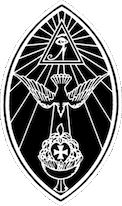
◤
◥
THE BOOK OF THE LAW
Hadit is the Ego or Atman in everything, but of course a loftier and more secret thing than anything understood by the Hindus. And of course the distinction between Ego and Ego is illusion. Hence Hadit, who is the life of all that is, if known, becomes the death of that individuality.
It follows that, as Hadit can never be known, there is no death. The death of the individual is his awakening to the impersonal immortality of Hadit. This applies less to physical death than to the Crossing of the Abyss; for which see Liber 418, Fourteenth Aethyr. One may attain to be aware that one is but a particular 'child' of the Play of Hadit and Nuit; one's personality is then perceived as being a disguise. It is not only not a living thing, as one had thought; but a mere symbol without substance, incapable of life. It is the conventional form of a certain cluster of thoughts, themselves the partial and hieroglyphic symbols of an 'ego.' The conscious and sensible 'man' is to his Self just what the printed letters on this page are to me who have caused them to manifest in colour and form. They are arbitrary devices for conveying my thought; I could use French or Greek just as well. Nor is this thought, here conveyed, more than one ray of my Orb; and even that whole Orb is but the garment of Me. The analogy is precise; therefore when one becomes "the knower," it involves the 'death' of all sense of the Ego. One perceives one's personality precisely as I now do these printed letters; and they are forgotten, just as, absorbed in my thought, the trained automatism of my mind and body expresses that thought in writing, without attention on my part, still less with identification of the extremes involved in the process.
